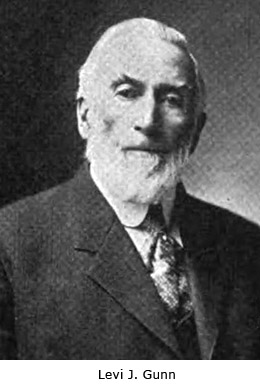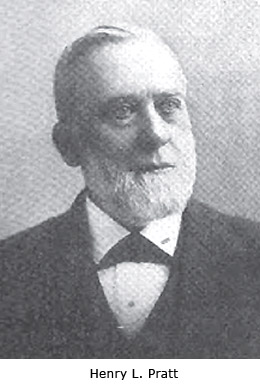The article below is one of a very few that can be found in
the popular press of the 19th and 20th Centuries attempting
to present Millers Falls Co. to a larger audience. However,
the informational value of this article is tinted with
glaring “sales pitch” approach taken by the magazine’s
editors. Hence, facts presented here need some
scrutiny.
At least one instance, the story on a Star Hack Saw
presented here is blatantly skewed and untruthful. I
included a brief explanation on this matter at the end of
the article.
Despite some inaccuracies, the article still has a good value
– it is the only source of pictures of the top management of
the company from the most interesting time period in its
existence. Unfortunately, there is no picture of Charles
Amidon, one of the founders of the company. WK
In a bowl in the hills of the Connecticut River valley in
Massachusetts lie the works of the Millers Falls Co. Nature has
graced the spot with rugged and wooded hills, steep valleys and
the swift flowing Millers River. One might select it as the
country home of poets instead of the seat of a bustling and
thriving manufacturing plant.
The rural setting makes all the more conspicuous
the appearance of the Millers Falls Co.’s plant in its midst.
There is trimness about the buildings and ground enclosed,
park-like, with high iron fence and substantial stone posts that
be speaks a well ordered establishment.
 The
Millers Falls Co. is the product of New England pluck and the
ability to seize an opportunity. In the early sixties, Levi J.
Gunn and Charles Amidon, fellow - workmen in the employ of the
Greenfield Tool Co., at Greenfield, Mass, decided to venture
alone, and erected a small manufacturing plant at North Parish,
so called, in Greenfield. The
Millers Falls Co. is the product of New England pluck and the
ability to seize an opportunity. In the early sixties, Levi J.
Gunn and Charles Amidon, fellow - workmen in the employ of the
Greenfield Tool Co., at Greenfield, Mass, decided to venture
alone, and erected a small manufacturing plant at North Parish,
so called, in Greenfield.
They had courage and little money. Funds were
borrowed to pay maturing loans, first here, then there. Peter
was robbed to pay Paul. It was such a hard struggle to keep the
insignificant enterprise afloat that the partners contrived in
every way possible to avoid expense.
Mr. Amidon made an old-fashioned overshot wheel
and used a rope, instead of a belt, for transmission, and when
water power failed in midsummer, the shop was practically
closed.
At first, they made clothes wringers, but so
limited were their resources that $300 was the high-water mark
of this stock.
In 1865, Wm. Barber of Windsor, Vt., brought to
the partners a sample of a new kind of bit brace. This was the
bit brace known to the present day as the Barber brace. The name
has stuck not only to the product of the Millers Falls Co., but
has come to be applied to this type of bit brace even though
later made by other manufacturers.
Mechanics were, however, wedded to their
old-fashioned wooden bit braces and it was only by means of
canvassers that the new bit braces found a foothold.
As at first made, they were entirely from malleable iron with a
bulge in the sweep as a handle. Eighteen braces were considered
a day’s work, but in a few years the business was fairly
established, and the product multiplied many times.
Mr. Pratt Arrives
Meanwhile, the $300 stock of wringers was stored
in Mr. Gunn’s barn. A fire wiped this out without insurance.
Then the plant at North Parish was destroyed in the same way,
but the partners, undismayed, resumed business almost at once
under the roof of the Greenfield Tool Co. Here again, a fire
occurred and destroyed the new beginnings.
 Previous
to this time, Henry L. Pratt, a man of some means, had become
interested in the enterprise and had aided the increasing
business by adding small tool holders and other devices of an
amateur nature. Previous
to this time, Henry L. Pratt, a man of some means, had become
interested in the enterprise and had aided the increasing
business by adding small tool holders and other devices of an
amateur nature.
For years he had been in the lumber business,
and in traveling up and down the country had become familiar
with various mill sites. He had often remarked that someday the
water power of the Millers River would be very valuable, and
counselled that Gunn & Amidon move to Grout’s Corner, now known
as Millers Falls, on this river.
Although in the wilderness, the spot was on the
turnpike from Troy, N. Y., to Boston and boasted a noted
hostelry. Herders en route to Boston made a point of reaching
Grout's Corner for a night’s stop, and the wild and roistering
bands that gathered there made the place historic in the
neighborhood. Little old men from their farms away back in the
hills jogged down occasionally to imbibe excitement in this
spirited company.
No one, however, became so hilarious or
visionary as to imagine that, in the next half century, this
aboriginal spot would be transformed by the ever-increasing
plant and business of the Millers Falls Co. Into such
surroundings came Mr. Pratt and his associates; sober, canny
men, with eyes keen to opportunities and no dreams, but
practical ideas of founding an enduring and successful
manufacturing business.
The spot selected for their operations was
overgrown with a dense forest and it was necessary to clear off
the property. A one-story brick factory two hundred and fifty
feet long and fifty feet wide was erected. This still remains,
with another story added, in the midst of many greater and more
modern buildings - a steady, silent growth, and still expanding.
So incredulous were the natives that the town, now subsisting on
the enterprise of the Millers Falls Co., then refused to build a
short bridge over the Millers River and finally the company had
to stand half of the expense of an old-fashioned covered wooden
structure that was built.
The start at Grout’s Corner was made in 1868.
The company was then incorporated under the name of Millers
Falls Manufacturing Company. The business was successful from
the start and continued under the above name until 1872, when it
was merged with the Backus Vise Co., of Windsor, VT., under the
name of Millers Falls Company.
|